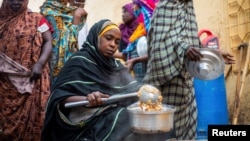Of the five classifications of levels of food insecurity, Phase 5, Famine, is the most serious. It is described by the Integrated Food Security Phase Classification system, or IPC, as an extreme lack of food or other basic needs even after full employment of coping strategies, wherein starvation, death, destitution, and extremely critical acute malnutrition levels are evident.
If 20 percent of the population is suffering from famine, and if two of every 10,000 people within an area die due to hunger every day, then the entire region is considered to be experiencing famine.
That is today the case in Sudan, according to a new United Nations report.
“Sudan is experiencing one of the greatest human crises not only of the day, but our lifetime,” said U.S. Representative to the U.N., Linda Thomas-Greenfield.
“At least five areas are currently experiencing famine. In five more, we see projected famine over the coming months. And at least 17 additional areas are at risk of famine in the same period. Over half a million people, including children, are struggling to survive.”
This catastrophe is the “direct result of 20 months of brutal civil war,” said Ambassador Thomas-Greenfield. What’s more, Sudanese authorities have suspended their collaboration with the IPC system, “and impede international efforts to provide humanitarian assistance and prevent starvation.”
“Each and every member sitting here today has seen the evidence that the SAF and RSF have committed war crimes. Each and every member sitting here today has seen evidence the RSF has committed crimes against humanity and engaged in ethnic cleansing,” she said. “And yet, Russia chose obstruction: standing alone as it voted to imperil civilians, while funding both sides of the conflict. And yes, that’s what I said: both sides.”
“Nevertheless, we will continue to work tirelessly to prevent abuses and hold perpetrators to account,” said Ambassador Thomas-Greenfield.
“The United States has imposed sanctions in response to atrocities and arms procurements, and we are prepared to take further action soon. Now, we renew our call for collective action, asking partners to join us in imposing sanctions on individuals and organizations whose actions have worsened this conflict.”
“We call on all actors to stop these ongoing atrocities,” said Ambassador Thomas-Greenfield, “to end the fighting, and allow immediate unconditional and unhindered humanitarian access so that tens of millions of people can get the food and water, shelter and medicine they so desperately need.”






